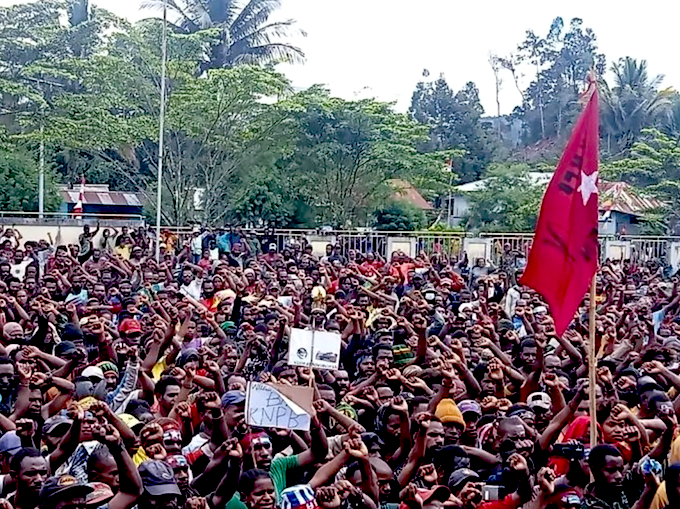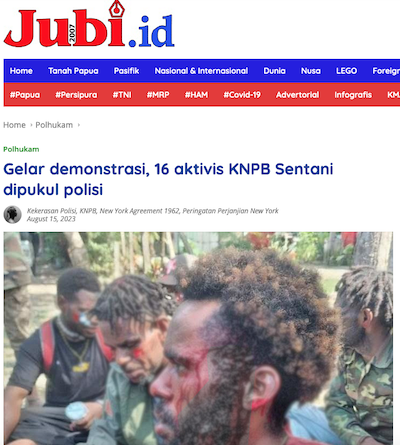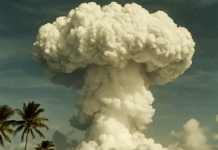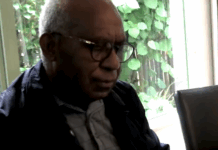
At least 20 people were wounded when police used batons, water cannon and tear gas to disperse hundreds of people who joined rallies in Indonesia’s West Papua region on the 61st anniversary of an agreement that made the territory part of Indonesia, news agencies report.
The US-brokered 1962 New York Agreement allowed Indonesia to annex the Christian-majority region after the end of Dutch colonial rule, according to a report in the UCA News.
Riot police attacked peaceful demonstrators in three locations near the provincial capital Jayapura yesterday, alleged Emmanuel Gobay, a Catholic and an official of the Papua Legal Aid Institute.
- READ MORE: West Papuan solidarity group condemns arrest of 21 activists protesting 1962 ‘tragedy’
- Other West Papua reports
The demonstrators called on the international community to review the agreement and take action to end ongoing violence and repression in the region, said the report.
“In fact, they only held peaceful demonstrations,” said Gobay, who joined one of the rallies.
He stated that more than 20 people were beaten, with one of them later being treated in hospital.
“One person was seriously injured and was immediately transported to the hospital for treatment,” he said.
Listening to speeches
Videos and photos obtained by UCA News showed police attacked with water canons and fired tear gas while people were listening to speeches from leaders of the West Papua National Committee (KNPB), the protest organiser.
Gobay said that although the authorities viewed the KNPB as a “separatist — pro-independence — group “they should have the right to express their opinion” as guaranteed in the nation’s constitution.
“Moreover, they submitted an official letter notifying police about the programme beforehand,” he added.
He condemned the use of water cannon and tear gas on demonstrators.
These should only be for anarchic demonstrations — “not peaceful demonstrations,” he said.

Gobay alleged that police committed criminal offences by torturing and beating protesters, and called on the Papuan police chief to immediately prosecute the perpetrators so that there was a deterrent effect, said the UCA News report.
Father Bernard Baru from the Jayapura Diocese’s Justice, Peace and Integrity of Creation Commission said that this repressive action was a repetition of the discriminatory treatment of Papuans by the state.
Brutal police action ‘normal’
“In Papua, police actions like this are considered normal. This only deepens discrimination against Papuans,” he said.
Police officials were not available for comment.
KNPB spokesman Ones Sahuniap issued a statement to condemn the police brutality and claimed those who were beaten suffered serious head injuries and bled profusely.
Suhuniap said the police used rattan and batons to beat and break up the demonstration.
The KNPB simultaneously held demonstrations in Papua and in other parts of Indonesia, asking the United Nations to review the 1962 New York Agreement.
During the rallies, KNPB leaders called the New York Agreement “a violation of human rights of Papuans” sponsored by Indonesia, the Netherlands and the United States and the United Nations.
Not party to agreement
As per the agreement, later added to the agenda of UN General Assembly, the Netherlands agreed to transfer the control of West Papua New Guinea to Indonesia, pending an UN-administered referendum.
The Papuans were not party to the agreement and it paved the way for the 1969 Act of Free Choice, an independence referendum favoring Indonesian rule in Papua whuch was largely regarded as a sham.
Indonesia’s annexation of Papua and use to force to crush dissent sparked an armed pto-indeoendence movement.
Thousands of civilians, soldiers and rebels have been killed and tens of thousands have been displaced due to the conflict in the easternmost region in the past decades.













































